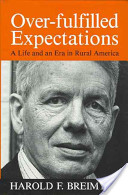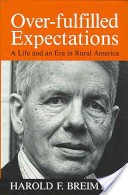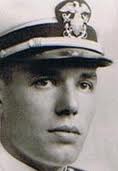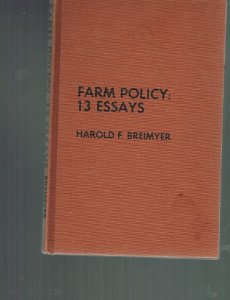Mother - Ella Breimyer
I once commented to Harold Breimyer that had he not chosen to be an economist, a career at which he distinguished himself at many levels over nearly seven decades, he could've been a superb journalist.
He tongue-in-cheekishly responded: "I once attempted to qualify, during my government career, but somehow a writing role was not regarded by them as prestigious enough."
He proved them wrong, winning prestige aplenty as the author of countless papers, books, and columns (all done on a typewriter — he never made the transition to a computer word processor). There were few practitioners of "the dismal science" who could so clearly or so thought-provokingly convey their observations on the economy, policy, and politics. He had a keen, probing curiosity about everything — which, combined with a wry, self-deprecating humor, elevated his writings far above the dry-as-dust, equation-laden works turned out by many of his fellows. His "On The Economy" columns, which ran for many years in Delta Farm Press, had a wide following and generated a lot of comment.
Dr. Breimyer, the Ohio farm boy who at 19 began his lifelong love affair with the many-faceted world of economics, died March 19 at age 86.
His was a remarkable career: The years as economist for the USDA and the Council of Economic Advisors, beginning in 1933 when the Roosevelt "New Deal" was changing the face of American agriculture, developing farm policy and serving as a liaison between the federal government and the nation's county agents who were implementing the landmark farm legislation; serving with distinction in World War II, retiring as lieutenant commander; and then, beginning in 1966, a distinguished career as Extension agricultural economist and professor at the University of Missouri-Columbia, which continued until his retirement a few years ago. His honors and awards over the years would fill a chunk of this newspaper.
Towering intellects are often accompanied by monumental egos. Not Harold Breimyer. He never lost his farm boy warmth, friendliness, and sense of humor, never took himself too seriously. He was a master at gently, but deftly skewering politicians and policies and his many speaking engagements around the country could always be counted on to fill a hall.
I had the great pleasure of crossing paths with him a number of times over the years, the last in 1998 when he accepted the American Agricultural Editors Association's Distinguished Service Award, and we kept up a now-and-then correspondence.
In a letter a while back, he expressed gratitude "for the many instances when someone has told me he (or she) reads my column in Delta Farm Press. Often that person adds: 'I usually agree with you.' My invariable reply is: 'I don't write in order to get people to agree; rather, I only try to introduce ideas that I believe people ought to think about.'"
Although he discontinued his regular columns for us when his health began failing, followed by heart bypass surgery and then bone cancer, he still wrote an every-Sunday column for the Columbia, Mo., Tribune, the last one appearing the day before he died. The lead paragraph read: "The game sometimes played of saying who counts for most in the mélange we call human society is a pointless game. In the final analysis, we are a herd of individuals who are mutually, even critically, dependent on each other. For my part, I have thought a most vitally important person to be the workman who collects the refuse that would otherwise go into putrefaction at the end of my street.
"But," he went on, "we cannot equalize everything, and if special recognition is to be granted, one of the candidates has to be the producer of food, for his provisioning of the world's population."
He was, to the end, the great champion of American agriculture and of the farmers who have made it one of the most productive "industries" on the face of the planet.
Self-described as a farm boy, Harold F. Breimyer hoped future generations of youth, particularly from rural areas, would receive similar educational opportunities. He loved his extension assignment and considered the Smith Lever Act, which established a nationwide Agricultural Extension Service, the most important law affecting U.S. agriculture in the twentieth century, outranking even the path-breaking Agricultural Adjustment Act of 1933.
Breimyer was a Professor of Agricultural Economics & Extension Economist at the University of Missouri from 1966 until 1984, when he took a Nominal Retirement due to the mandatory retirement age. In his own words, Breimyer "did not miss a day in continuing his professional activity". He composed a weekly column that was published in the local paper, with the final column being published one day before his death at age 86 in 2001.
Breimyer was awarded AJAE's Best Article Award in 1954, 1957, and 1962. He was the University of Missouri, Gamma Sigma Delta, Superior Teaching Award recipient of 1981 and given the American Agricultural Editor's Association Distinguished Service Award in 1998, among other honors. Of his many awards and successes, Breimyer considered being named Elected Fellow by the America Agricultural Economics Association in 1973 and achieving the Thomas Jefferson Award at the University of Missouri in 1983 his most meaningful awards.
The annual Breimyer Seminar on Agriculture sponsored by the University of Missouri is held yearly. Each year the event addresses the status of the agriculture sector and offers an outlook for what lies ahead.
LST-448 crew member Herbert Dowden
---------------------------
Mr. T. V. Dowden of Mt. Liberty has received the following letter of sympathy from Lt. (jg) Harold F. Breimyer, USNR, an officer on the ship in which Herbert Dowden lost his life during an engagement in the Southwest Pacific area last October:
"Mr. T. V. Dowden
Mt. Liberty, Ohio.
Dear Mr. Dowden:
In some respects I should not write you a letter reminding you of the death of your son, but because I doubt that you have gone far toward forgetting, I am doing so in order to give you a little recent information.
I was an officer on your son's ship, having been with him since the day the crew was formed in the Solomons, Maryland. Although there is no bond like that of ones family, an officer in the Navy develops a strong personal feeling when he has worked with a man for a long time, watching him develop from a "boot" to a man capable of carrying out his duties on board a ship on his own responsibility. As your son's officer I too mourn his death.
Because of the length of time that has elapsed, I can now give you a little more information than could Captain Roeschke. Our ship was hit by aerial bombs while we were beached, unloading cargo. It was at a forward area, and we were at our battle stations. Your son was on a gun on main deck. The hit was nearly directly on the gun, the entire crew of which was wiped out. I think that death came quickly, probably without any realization of the hit.
Through the enterprise of a New Zealand Army Unit, a monument to the men lost on our ship has been erected at the site of the beaching. I saw it some time ago, finding it to be an appropriate type stone, about four feet high and pyramidal in form. I received permission to attach a plaque commemorating and naming the men of the ship's crew who died. The plaque has now been completed and forwarded. It was my thought that you would appreciate knowing of the memorial. I cannot tell you yet the name of the island where our ship was lost. I am saving all addresses, planning a further letter of information after the war. Should you (undecipherable) address .. Portland, Indiana. Meanwhile if I can answer any questions I will be glad to receive them.
I possibly should add that I have not had a chance to visit the burial ground. Interment was made by a unit of U. S. Marines, and as yet I have no information other than that the bodies recovered were buried in a U. S. Navy Cemetery on the island. At present I can't give much confidence on this point.
I can do little more than offer you my sincere sympathy. Those of us who were also in the engagement often wonder why it was we who were saved, unhurt in my case, while others were killed. It is beyond my power to give an answer.
Captain Roeschke and nearly all the enlisted men have now returned to the United States for leave and new assignments, with the rest of the men due to return soon. The officers will stay out here for a while longer.
Yours very sincerely,
HAROLD F. BREIMYER
LT. (jg) USNR"
Harold Frederick Breimyer
Edit Profile
Agricultural economist
Harold Frederick Breimyer, American Agricultural economist. Recipient Superior Service award Department Agriculture, 1954, 59, Centennial award College Agriculture and Home Economics, Ohio State University, 1970, Faculty-Alumni award University Missouri, 1975, Thomas Jefferson award University Missouri, 1983.
Background
Breimyer, Harold Frederick was born on April 13, 1914 in Fort Recovery, Ohio, United States. Son of Fred Christian and Ella Anna Margaret (Schulz) Breimyer.
Education
Bachelor of Science, Ohio State University, 1934. Master of Science, Ohio State University, 1935. Doctor of Philosophy, American University, 1960.
Career
Staff economist, Agricultural Adjustment Administration, 1936-1939; Staff economist, Bureau Agricultural Economics, 1939-1953; Staff economist, Agricultural Marketing Service, 1954-1959, 61-66; Staff economist, Council Economics Advisers, 1959-1961; member of faculty, U. Missouri, Columbia, 1966-1984; professor agricultural economics, U. Missouri, 1966-1984; extension economist, U. Missouri, 1968-1984; visiting Anderson scholar, Ohio State University, 1985; teaching associate, U. Missouri, since 1986.
Achievements
Harold Frederick Breimyer has been listed as a noteworthy Agricultural economist by Marquis Who's Who.
Works
Farm policy: 13 essays Farm policy: 13 essays
Over-Fulfilled Expectations: A Life and an Era in Rural America (Agricultural History & Rural Studies) Over-Fulfilled Expectations: A Life and an Era in Rural America (Agricultural History & Rural Studies)
Individual Freedom and the Economic Organization of Agriculture Individual Freedom and the Economic Organization of Agriculture
More photos
book
Over-Fulfilled Expectations: A Life and an Era in Rural America (Agricultural History & Rural Studies) ( During the 1920s, the United States, suddenly aware of ...)
Economics of the Product Markets of Agriculture (Book by Breimyer, Harold F.)
Farm policy: 13 essays
Individual Freedom and the Economic Organization of Agriculture
Membership
Member Montgomery County (Maryland) Board Education, 1959-1962, president, 1961. President Columbia Council Churches, 1974-1976. Served with United States Naval Reserve, 1942-1945.
Fellow American Agricultural Economics Association (president 1969). Member International Association Agricultural Economists. Clubs: Lions.
Connections
Married Rachel Eudora Styles, December 13, 1941. 1 child, Frederick Styles.
Father:
Fred Christian Breimyer
Mother:
Ella Anna Margaret (Schulz) Breimyer
Spouse:
Rachel Eudora Styles
child:
Frederick Styles Breimyer
District of Columbia, Marriage Records,
Name: Harold Frederick Breimyer
Gender: Male
Age: 27
Birth Date: abt 1914
Marriage Date: 13 Dec 1941
Spouse: Rachel Eudora Styles
Mother - Ella Breimyer
I once commented to Harold Breimyer that had he not chosen to be an economist, a career at which he distinguished himself at many levels over nearly seven decades, he could've been a superb journalist.
He tongue-in-cheekishly responded: "I once attempted to qualify, during my government career, but somehow a writing role was not regarded by them as prestigious enough."
He proved them wrong, winning prestige aplenty as the author of countless papers, books, and columns (all done on a typewriter — he never made the transition to a computer word processor). There were few practitioners of "the dismal science" who could so clearly or so thought-provokingly convey their observations on the economy, policy, and politics. He had a keen, probing curiosity about everything — which, combined with a wry, self-deprecating humor, elevated his writings far above the dry-as-dust, equation-laden works turned out by many of his fellows. His "On The Economy" columns, which ran for many years in Delta Farm Press, had a wide following and generated a lot of comment.
Dr. Breimyer, the Ohio farm boy who at 19 began his lifelong love affair with the many-faceted world of economics, died March 19 at age 86.
His was a remarkable career: The years as economist for the USDA and the Council of Economic Advisors, beginning in 1933 when the Roosevelt "New Deal" was changing the face of American agriculture, developing farm policy and serving as a liaison between the federal government and the nation's county agents who were implementing the landmark farm legislation; serving with distinction in World War II, retiring as lieutenant commander; and then, beginning in 1966, a distinguished career as Extension agricultural economist and professor at the University of Missouri-Columbia, which continued until his retirement a few years ago. His honors and awards over the years would fill a chunk of this newspaper.
Towering intellects are often accompanied by monumental egos. Not Harold Breimyer. He never lost his farm boy warmth, friendliness, and sense of humor, never took himself too seriously. He was a master at gently, but deftly skewering politicians and policies and his many speaking engagements around the country could always be counted on to fill a hall.
I had the great pleasure of crossing paths with him a number of times over the years, the last in 1998 when he accepted the American Agricultural Editors Association's Distinguished Service Award, and we kept up a now-and-then correspondence.
In a letter a while back, he expressed gratitude "for the many instances when someone has told me he (or she) reads my column in Delta Farm Press. Often that person adds: 'I usually agree with you.' My invariable reply is: 'I don't write in order to get people to agree; rather, I only try to introduce ideas that I believe people ought to think about.'"
Although he discontinued his regular columns for us when his health began failing, followed by heart bypass surgery and then bone cancer, he still wrote an every-Sunday column for the Columbia, Mo., Tribune, the last one appearing the day before he died. The lead paragraph read: "The game sometimes played of saying who counts for most in the mélange we call human society is a pointless game. In the final analysis, we are a herd of individuals who are mutually, even critically, dependent on each other. For my part, I have thought a most vitally important person to be the workman who collects the refuse that would otherwise go into putrefaction at the end of my street.
"But," he went on, "we cannot equalize everything, and if special recognition is to be granted, one of the candidates has to be the producer of food, for his provisioning of the world's population."
He was, to the end, the great champion of American agriculture and of the farmers who have made it one of the most productive "industries" on the face of the planet.
Self-described as a farm boy, Harold F. Breimyer hoped future generations of youth, particularly from rural areas, would receive similar educational opportunities. He loved his extension assignment and considered the Smith Lever Act, which established a nationwide Agricultural Extension Service, the most important law affecting U.S. agriculture in the twentieth century, outranking even the path-breaking Agricultural Adjustment Act of 1933.
Breimyer was a Professor of Agricultural Economics & Extension Economist at the University of Missouri from 1966 until 1984, when he took a Nominal Retirement due to the mandatory retirement age. In his own words, Breimyer "did not miss a day in continuing his professional activity". He composed a weekly column that was published in the local paper, with the final column being published one day before his death at age 86 in 2001.
Breimyer was awarded AJAE's Best Article Award in 1954, 1957, and 1962. He was the University of Missouri, Gamma Sigma Delta, Superior Teaching Award recipient of 1981 and given the American Agricultural Editor's Association Distinguished Service Award in 1998, among other honors. Of his many awards and successes, Breimyer considered being named Elected Fellow by the America Agricultural Economics Association in 1973 and achieving the Thomas Jefferson Award at the University of Missouri in 1983 his most meaningful awards.
The annual Breimyer Seminar on Agriculture sponsored by the University of Missouri is held yearly. Each year the event addresses the status of the agriculture sector and offers an outlook for what lies ahead.
LST-448 crew member Herbert Dowden
---------------------------
Mr. T. V. Dowden of Mt. Liberty has received the following letter of sympathy from Lt. (jg) Harold F. Breimyer, USNR, an officer on the ship in which Herbert Dowden lost his life during an engagement in the Southwest Pacific area last October:
"Mr. T. V. Dowden
Mt. Liberty, Ohio.
Dear Mr. Dowden:
In some respects I should not write you a letter reminding you of the death of your son, but because I doubt that you have gone far toward forgetting, I am doing so in order to give you a little recent information.
I was an officer on your son's ship, having been with him since the day the crew was formed in the Solomons, Maryland. Although there is no bond like that of ones family, an officer in the Navy develops a strong personal feeling when he has worked with a man for a long time, watching him develop from a "boot" to a man capable of carrying out his duties on board a ship on his own responsibility. As your son's officer I too mourn his death.
Because of the length of time that has elapsed, I can now give you a little more information than could Captain Roeschke. Our ship was hit by aerial bombs while we were beached, unloading cargo. It was at a forward area, and we were at our battle stations. Your son was on a gun on main deck. The hit was nearly directly on the gun, the entire crew of which was wiped out. I think that death came quickly, probably without any realization of the hit.
Through the enterprise of a New Zealand Army Unit, a monument to the men lost on our ship has been erected at the site of the beaching. I saw it some time ago, finding it to be an appropriate type stone, about four feet high and pyramidal in form. I received permission to attach a plaque commemorating and naming the men of the ship's crew who died. The plaque has now been completed and forwarded. It was my thought that you would appreciate knowing of the memorial. I cannot tell you yet the name of the island where our ship was lost. I am saving all addresses, planning a further letter of information after the war. Should you (undecipherable) address .. Portland, Indiana. Meanwhile if I can answer any questions I will be glad to receive them.
I possibly should add that I have not had a chance to visit the burial ground. Interment was made by a unit of U. S. Marines, and as yet I have no information other than that the bodies recovered were buried in a U. S. Navy Cemetery on the island. At present I can't give much confidence on this point.
I can do little more than offer you my sincere sympathy. Those of us who were also in the engagement often wonder why it was we who were saved, unhurt in my case, while others were killed. It is beyond my power to give an answer.
Captain Roeschke and nearly all the enlisted men have now returned to the United States for leave and new assignments, with the rest of the men due to return soon. The officers will stay out here for a while longer.
Yours very sincerely,
HAROLD F. BREIMYER
LT. (jg) USNR"
Harold Frederick Breimyer
Edit Profile
Agricultural economist
Harold Frederick Breimyer, American Agricultural economist. Recipient Superior Service award Department Agriculture, 1954, 59, Centennial award College Agriculture and Home Economics, Ohio State University, 1970, Faculty-Alumni award University Missouri, 1975, Thomas Jefferson award University Missouri, 1983.
Background
Breimyer, Harold Frederick was born on April 13, 1914 in Fort Recovery, Ohio, United States. Son of Fred Christian and Ella Anna Margaret (Schulz) Breimyer.
Education
Bachelor of Science, Ohio State University, 1934. Master of Science, Ohio State University, 1935. Doctor of Philosophy, American University, 1960.
Career
Staff economist, Agricultural Adjustment Administration, 1936-1939; Staff economist, Bureau Agricultural Economics, 1939-1953; Staff economist, Agricultural Marketing Service, 1954-1959, 61-66; Staff economist, Council Economics Advisers, 1959-1961; member of faculty, U. Missouri, Columbia, 1966-1984; professor agricultural economics, U. Missouri, 1966-1984; extension economist, U. Missouri, 1968-1984; visiting Anderson scholar, Ohio State University, 1985; teaching associate, U. Missouri, since 1986.
Achievements
Harold Frederick Breimyer has been listed as a noteworthy Agricultural economist by Marquis Who's Who.
Works
Farm policy: 13 essays Farm policy: 13 essays
Over-Fulfilled Expectations: A Life and an Era in Rural America (Agricultural History & Rural Studies) Over-Fulfilled Expectations: A Life and an Era in Rural America (Agricultural History & Rural Studies)
Individual Freedom and the Economic Organization of Agriculture Individual Freedom and the Economic Organization of Agriculture
More photos
book
Over-Fulfilled Expectations: A Life and an Era in Rural America (Agricultural History & Rural Studies) ( During the 1920s, the United States, suddenly aware of ...)
Economics of the Product Markets of Agriculture (Book by Breimyer, Harold F.)
Farm policy: 13 essays
Individual Freedom and the Economic Organization of Agriculture
Membership
Member Montgomery County (Maryland) Board Education, 1959-1962, president, 1961. President Columbia Council Churches, 1974-1976. Served with United States Naval Reserve, 1942-1945.
Fellow American Agricultural Economics Association (president 1969). Member International Association Agricultural Economists. Clubs: Lions.
Connections
Married Rachel Eudora Styles, December 13, 1941. 1 child, Frederick Styles.
Father:
Fred Christian Breimyer
Mother:
Ella Anna Margaret (Schulz) Breimyer
Spouse:
Rachel Eudora Styles
child:
Frederick Styles Breimyer
District of Columbia, Marriage Records,
Name: Harold Frederick Breimyer
Gender: Male
Age: 27
Birth Date: abt 1914
Marriage Date: 13 Dec 1941
Spouse: Rachel Eudora Styles
Gravesite Details
gps 40.53277166666667 -84.396825









